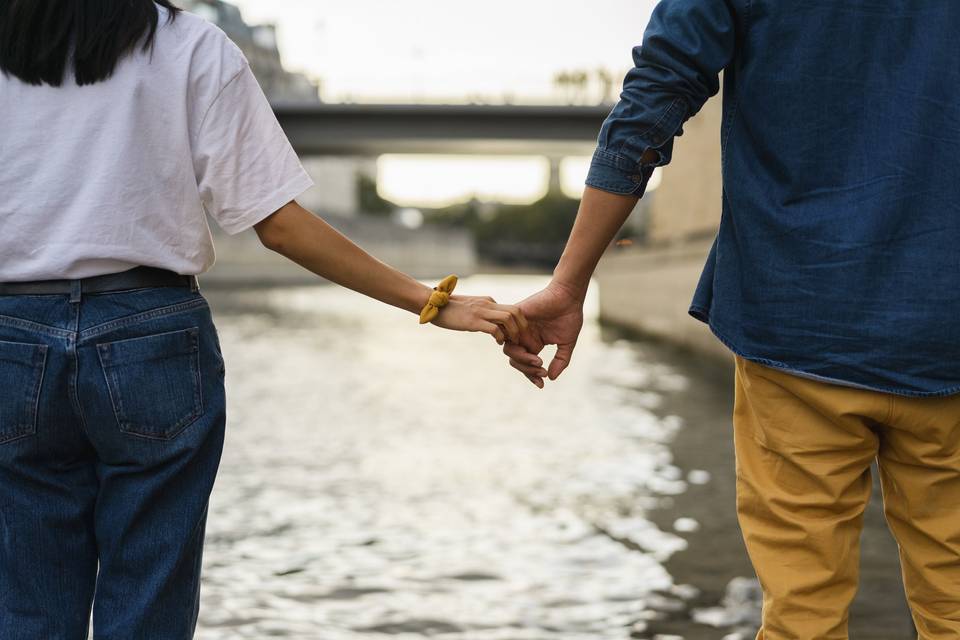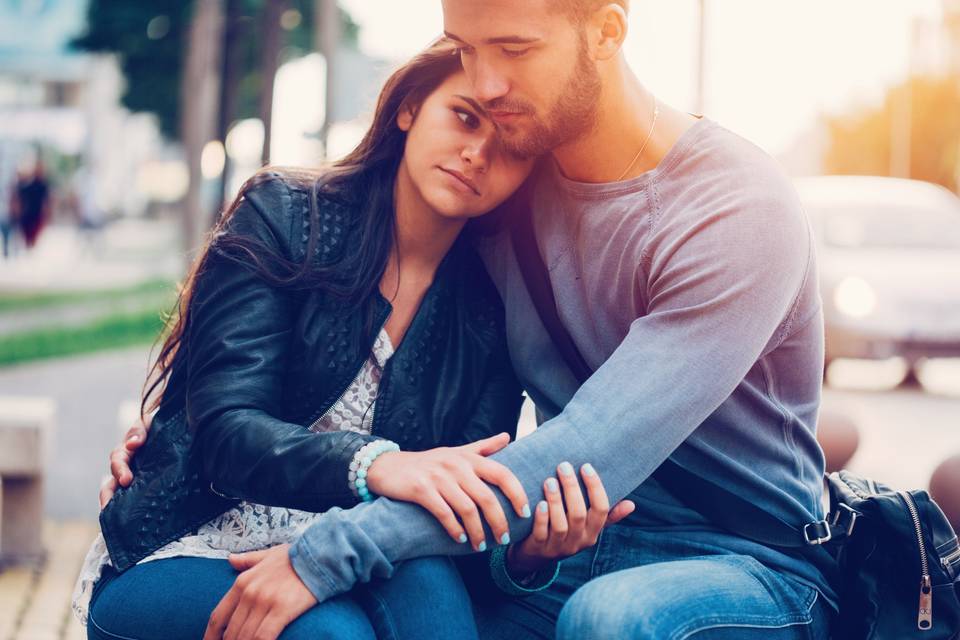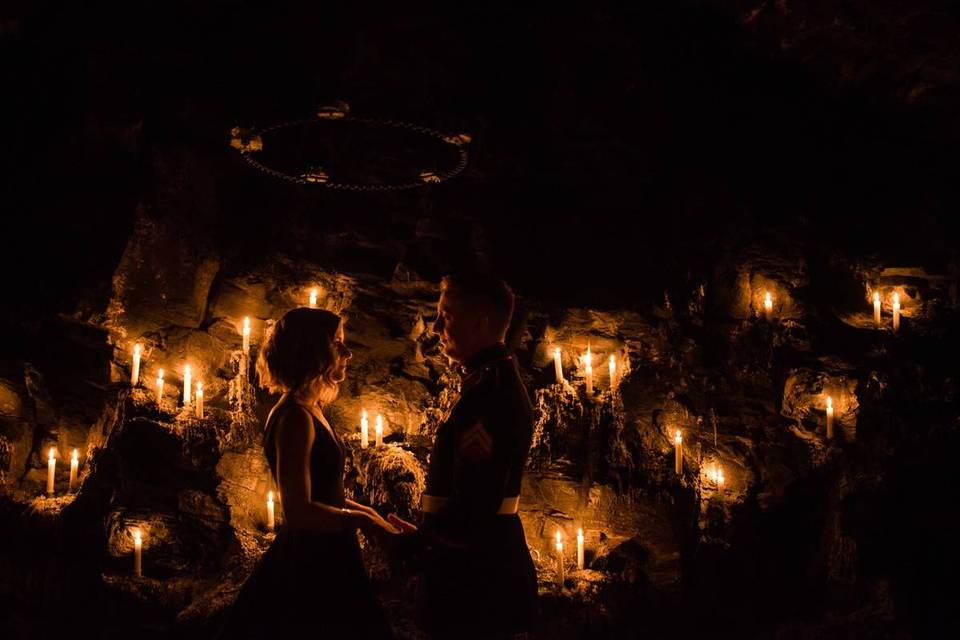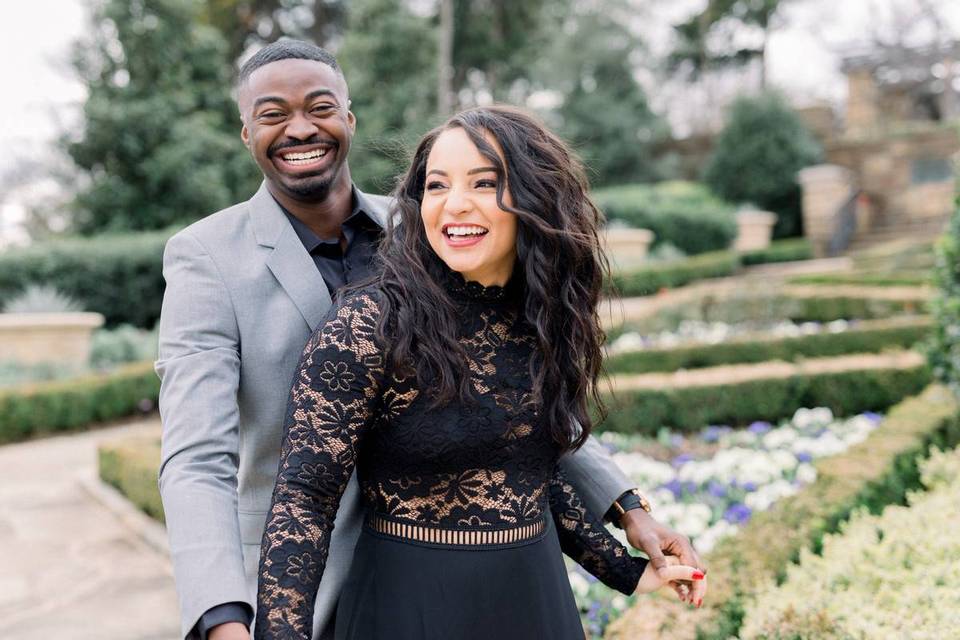1 Year Later: 5 Couples Reflect On How 2020 Affected Their Relationships
How do couples cope when they’ve lived through "for worse" before they say "I do". Here, 5 couples share what they learned during the year that was 2020.
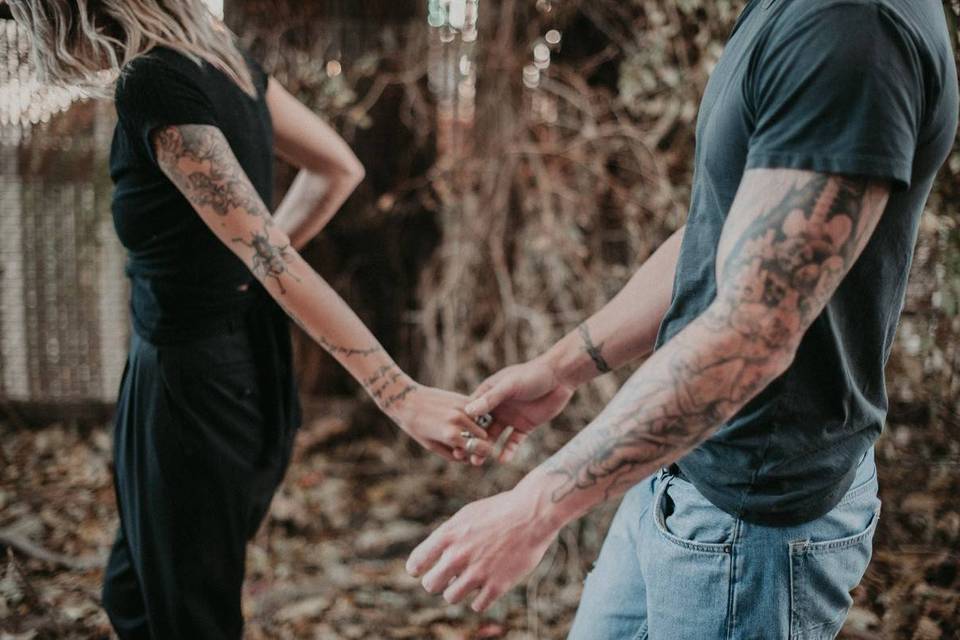
Few couples were left unaffected by 2020. Whether you were planning an intimate wedding or had spent the last two years coordinating the party of a lifetime, the global pandemic forced almost all plans to change. More than half of couples made the difficult decision to either cancel or postpone their wedding, and the remaining made great adjustments, including social distancing rules, face mask favors, and the added virtual option to the RSVP.
It was also a year that forced nearly every couple to reevaluate their relationship and priorities and examine what it meant to support and show up as partners. While there has been coverage of how the pandemic affected a couple's wedding plans, few have opened up publicly about how it affected their relationship. We sat down with 5 couples to talk about how the past year affected their relationships, their outlook on commitment, and the evolution of their relationships.
Processing trauma
Often when we hear the word "trauma," we think about some of life's most unthinkable events, such as loss, harm, or natural disasters. While true, trauma is an emotional response to a terrible event. It can be offset by other life events, including a cross-country move, transitioning to quarantine life, witnessing social injustice, and the overwhelm of everyday stress. So, 2020.
Many of us are still sitting with the traumatic stress of 2020 and learning how to cope. Terry,* a 30-something marketing professional, opened up about their own mental health battle. “As an individual, this year has been nothing but hard. Even before the pandemic started, I was experiencing crippling anxiety as a result of my old job. Then my roommate got the flu in late February, so I was quarantined before everyone else. The last time I kissed my partner in February ended up being the last time I would touch him or another human for over two months. As an extrovert with a love language of physical touch, I basically lost my sources of energy overnight.”
Experts will advise to lean on loved ones, face their fears, and prioritize self-care. With phrases like 'post-COVID stress disorder' becoming more normalized, it's not too shocking to learn that break-ups and divorces rose and continue to rise in 2021. And one doesn’t need to look far to find a correlation between the trauma of 2020 and their relationship status. Good Therapy reports that hard seasons of life can have effects on intimacy, relationship satisfaction, and conflict resolution. This was certainly the case for one Southwestern couple, "We had to confront red flags we had been casually avoiding before," admits Nicole*, a 20-something working in higher education. "From views on money to the reality of answering the question, what do we want to do as a couple for the next five years? [Things] got real. … And there was a behavior I no longer wanted to tolerate living under one roof 24/7."
While some couples were assessing their future, others found new ways to enjoy the present. Lindsay*, a 30-something program director whose multicultural wedding was postponed to 2022 shared, “I think I've learned to appreciate my love language, ‘quality time’, even more. Emphasis on "quality." My fiance and I have been working from home together for a year now, and although we spend time with each other all day, every day, it's important for me to still get that "quality" time in. It's hard to turn off work when you're at home, but it's important to me to set apart time to still have fun and have thoughtful conversations, and be present with each other.”
No matter how the year evolved the relationship, it’s important to take stock of your relationship and truly assess who and what is the problem according to psychologist Dr. Dori Gatter. “Because you haven’t had the distractions,” she says. “Neither of you has had a release valve, which leaves the potential for issues to build up.”
Redefining commitment
Similarly, trauma can also bring a couple closer together. Perhaps a partner was able to show support during family loss. For those like Nicole, quarantine only extended what it meant to be a partner. "We had hard times that tested our relationship, as I mentioned. We had to go to counseling. But when it came to us facing backlash in June [during the social justice movement], I am grateful my partner supported me [as we are an interracial couple], especially when having difficult conversations with his conservative family. And similarly, I believe I showed up when their grandmother died unexpectedly from COVID. Beyond the Netflix marathons and tropical vacations, you want to know that someone will be there in your darkest moments. Oddly, 2020 gave us that."
Other couples became reacquainted with each other, living under one roof 24/7. Sabrina*, a 30-year-old account executive, shared this after pushing her 2020 nuptials back one year, "I think we became closer than ever this year. We had to think about the future and what life could be like in the next year. What long-term impacts will this pandemic have on the world? It forced us to have great, meaningful conversations about the future." Echoing her sentiment was Terry, “We've had our moments, just like every couple, but I think what I've realized this past year through the good and the bad is that there's no other person I could have gotten through this chaos with. We've learned to communicate our needs better, to identify when one needs introversion time and the other extroversion. We've been able to pay attention to the others' needs while also putting our own in the forefront. It's important to remember that you have to love yourself in order to love others, so we both prioritize self-care, especially now.”
One couple, Mel and Dylan*, 30-somethings working in recruitment and entertainment, adapted their April 2020 wedding by choosing to get married at City Hall in their hometown and host 1st anniversary reception at their original wedding location. Despite the ceremonial setback, Mel found a new appreciation for her now-spouse. "I think our bond became stronger. We went through so much last year. We had to cancel our wedding three weeks before, and then on the week that I should have been having our dream wedding surrounded with friends and family, I was laid off from my job. I felt like my entire world was crashing down around me. But in that craziness, we prioritized our relationship and got married in a courthouse ceremony on our original wedding date. That was a defining moment for us - even in chaos, we will prioritize and accomplish our goals. We can pivot together. And now, several months later, by doing that over and over again, I am in a job that pays significantly more than the one I was let go from, and we are closing on a house at the end of this month."
Facing and resolving disputes
But few lessons and evolutions are achieved through empathy and grace alone. Often couples endure a season of discomfort to find strength in their foundation. Mel's partner, Dylan*, shared, "I have learned that my spouse and I carry stress differently. I think the key is patience, empathy, and not trying to overanalyze how they're feeling. Sometimes their reaction doesn't make sense to me at the moment, but that doesn't mean that it's wrong for them to react that way. When you get married, you make a promise that your ego won't outweigh whatever is going on with your partner, and I think that this year tested that."
Adding to her spouse's comment, Mel shared how 2020 and wedding planning meant a breakaway from a beloved friend. "I had a friend with whom I was close, but our values weren't always aligned. We ended up having a fundamental disagreement this year around me sharing things with my husband that she had shared with me. I refuse to withhold information from my husband - just because [a friend and I] talk about something doesn't mean that I am going to bring it up with [my now-husband], but I think it's a slippery slope to promise anyone that I won't tell him something. [The friend and I] haven't talked since then. It wasn't super dramatic; I think that we both just realized that this relationship wasn't going to work for us. It's been such a huge weight off. I think I knew deep inside for some time that our values misalignment was a really big deal, but I wasn't giving it the weight that it deserved. This was a growing moment for me, and I am so glad that it happened the way it did."
Though many of us mark 2020 by the global pandemic and our shelter-in-place orders, millions were thrown into a tornado of political debates with family and friends. Sabrina opened up and shared, "I do think [family] tried to push their political views on me in 2020 just because everyone was hyper-sensitive. However, I don't think the relationship has changed that much. If anything, it probably made our relationships stronger. It's something we all had to go through together." Mel shared a similar experience with her family, "I have a challenging relationship with my parents, that would take an encyclopedia to break down. But I will say that this year has put a tremendous strain on our relationship. We are already on opposite ends of the political spectrum, but I think because of this year, our differences are much more real and sobering."
Looking toward the future
As we begin to put 2020 and its debris behind us, we're starting to see the silver linings it left. "I learned a lot about myself; my relationship with my co-workers, gym friends, people I used to see every day. I realized how much I hang my identity on the people I used to interact with on a daily basis. I just learned how important those relationships are to my day-to-day happiness. And I learned that digital interactions like Zooms can't replace it,” Sabrina shared. And she acknowledged how outside of wedding venues and party favors, we have work to do as a country. She added, "I do try and see everyone's point of view more. We are all so different, and that's what makes us great. I stopped trying to think I was always right and came to terms with the fact that everyone has a different story."
As for those who entered the pandemic as people-pleasers, they're leaving much more empowered. Mel shared, "I am determined to get what I am owed. ... After 2020, life is way too short to sit around and wait for the universe to give me what I'm owed. … I will be the one who speaks up and says what they need, even if it's challenging or I think people don't want to hear it. I am going to share my accomplishments, promote myself, speak up, and I am going to get what I am owed."
Like so many, Terry is focused on rebuilding with the help of their partner. “Over the past year, I've lost myself in many ways, but am working towards renewing my relationship with myself and recreating my identity. Early on in our relationship, my partner told me about Kintsugi. It's a form of Japanese artwork where you use gold to mend broken ceramics, making the repaired pot even more beautiful. That's what I'm hoping will come from this year. A more whole and complete me.”
And Ted*, the 30-something talent manager and fiance of Lindsay*, shared his greatest lesson over the last year, “Don’t be a [hard person to live with]. Essentially, be supportive and appreciate each other during this unprecedented time.”
Ultimately, the last 12 months have challenged couples to redefine, refocus, and recover in ways we likely couldn’t imagine in 2019. Throughout speaking with each couple, one theme stayed consistent: empathy. Leading with empathy is the key to coming through these trying times even stronger than before.

